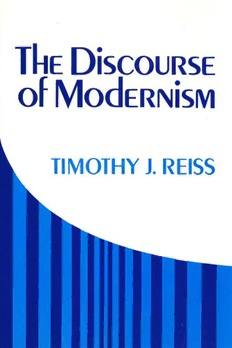
The Discourse of Modernism PDF
Preview The Discourse of Modernism
The Discourse of Modernism BY THE SAME AUTHOR: Toward Dramatic Illusion: Theatrical Technique and Meaning from Hardy to "Horace" Tragedy and Truth: Studies in the Development of a Renaissance and Neoclassical Discourse The Discourse of Modernism J. TIMOTHY REISS Cornell University Press Ithaca and London Open access edition funded by the National Endowment for the Humanities/ Andrew W. Mellon Foundation Humanities Open Book Program. Copyright © 1982 by Cornell University All rights reserved. Except for brief quotations in a review, this book, or parts thereof, must not be reproduced in any form without permission in writing from the publisher. For information, address Cornell University Press, Sage House, 512 East State Street, Ithaca, New York 14850, or visit our website at cornellpress.cornell.edu. First published 1982 by Cornell University Press First printing, Cornell Paperbacks, 1985 Library of Congress Cataloging-in-Publication Data Reiss, Timothy J., 1942– The discourse of modernism. Bibliography: p. Includes index. 1.Knowledge, Theory of. 2. Epistemics. I. Title. BD161.R46 190 81-15212 AACR2 ISBN-13: 978-0-8014-1464-0 (cloth) — ISBN-13: 978-0-8014-9336-2 (pbk.) The text of this book is licensed under a Creative Commons Attribution-NonCommercial-NoDerivatives 4.0 International License: https://creativecommons.org/licenses/by-nc-nd/4.0/ For Jean (and all the waiting) and in memory of my mother, 19og-1981 Contents Preface 9 A Note on Punctuation 17 1 On Method, Discursive Logics, and Epistemology 21 2 Questions of Medieval Discursive Practice 55 3 From the Middle Ages to the (W)Hole of Utopia 108 4 Kepler, His Dream, and the Analysis and Pattern of Thought 140 5 Campanella and Bacon: Concerning Structures of Mind 168 6 The Masculine Birth of Time 198 7 Cyrano and the Experimental Discourse 226 8 The Myth of Sun and Moon 261 9 The Difficulty of Writing 277 10 Crusoe Rights His Story 294 11 Gulliver's Critique of Euclid 328 12 Emergence, Consolidation, and Dominance of a Discourse 351 Bibliography 387 Index 4°3 I was young then and did not know how difficult it is for Western man to understand the dream-heavy classical soul. They are so far apart. The god of superlative shape has been replaced by the god of superlative force and between the two conceptions there is all space. -Eric Ambler, Journey into Fear Expressing their thoughts in words of which they are not the mas ters, enclosing them in verbal forms whose historical dimensions they are unaware of, men believe that their speech is their servant and do not realize that they are submitting themselves to its de mands. -Michel Foucault, Les mots et les choses It may always be asserted that determinant paths must exist between the slave system characteristic of Greek society and the miracle of geometry, that the appearance of the applied sciences from the neo classical era on must be conditioned in various ways by the mercan tile economy of modern Europe, and so on. It can be asserted. It is correct to do so. That does not change the fact that the outline of these paths, the detailed description of such conditions is non existent. The matter has perhaps been logically demonstrated, it has not been shown. -Michel Serres, "Les sciences" Preface The present work examines aspects of the emergence and development, of the consolidation and growth to dominance, of modern Western discourse-or, as I will be calling it, the "analytico referential." The book sets up a model to describe how one domi nant discourse gives way to another. In particular, it shows the cre ation and development of the various elements fundamental to analytico-referential discourse, and it demonstrates at the same time the necessary occultation of other elements whose visible presence in discourse would subvert its overt aims (though such occultations are not "intentional"). The basic claim is that the kind of epistemic de velopment seen in the early seventeenth century, preceded by at least a century of crisis and followed by a half century of consolida tion, is being echoed in our own time and is leading to a similarly significant and complete conceptual change. I also claim that the change of our own time can be understood only in the light of the earlier one, and that it is urgent to understand just what kind of arguments and assertions were necessary to the establishment of the "discursive class" now being placed in question. The principal corpus I use in establishing these claims is composed of science fictions and utopias drawn from the critical historical moment of the European Renaissance and Neoclassicism. These brief assertions require some immediate explanation and clarification. The term "discourse" refers to the way in which the material em bodying sign processes is organized. Discourse can thus be character ized as the visible and describable praxis of what is called "thinking." For thinking is nothing but the organization of signs as an ongoing process. Signs themselves may be 'defined' provisionally as the non discrete 'elements' composing the process toward meaningfulness that itself is both defined by and defining of what signs are. So 9
